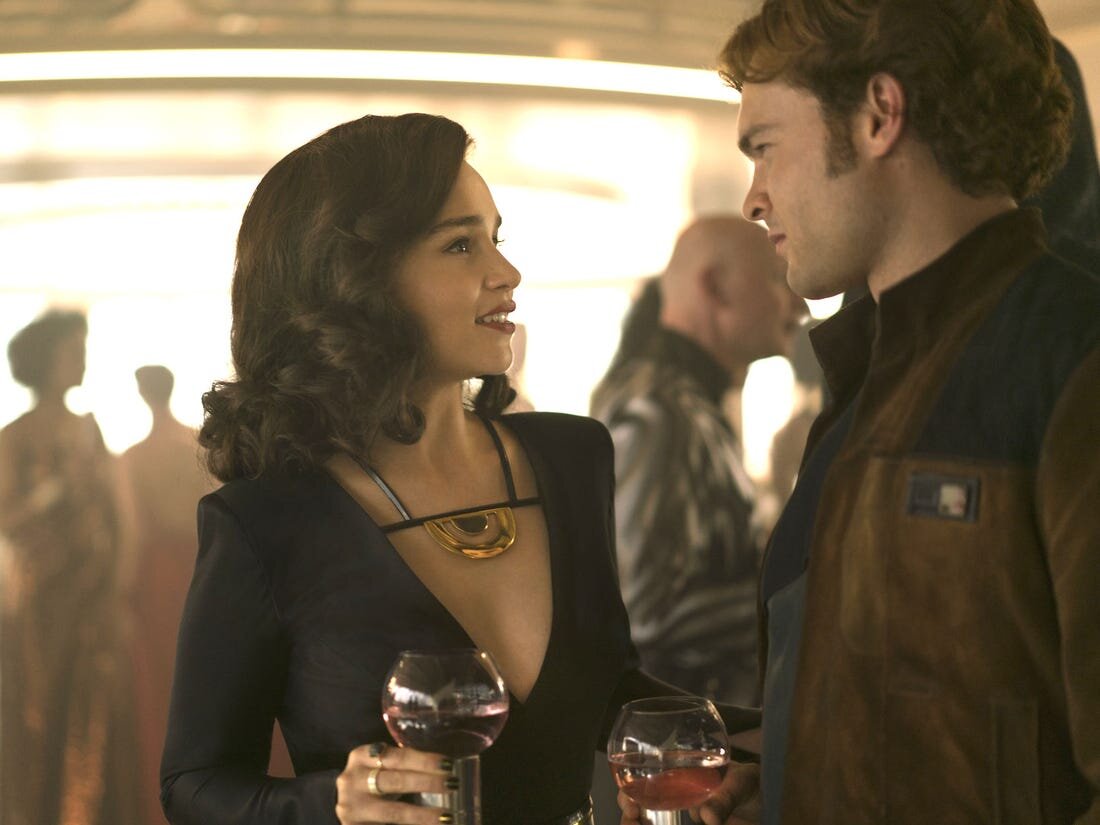By: Selene Jade
With outfits that rival Padmé's, and a martial arts style of fighting we've never seen from any of our leading ladies before, Qi'ra encapsulates everything a female lead in Star Wars can be. The movie shows her to us through Han's eyes, but we're also shown that the way he views her is flawed, and not how she truly is. It's rare to see this kind of duality given to a female character that isn't the main lead.
Qi'ra is anything but predictable. She is the film's conduit to show Han how the galaxy really is, and to teach him a lesson. Yet Qi’ra fulfills this role in a much more fleshed out way than the overused manic-pixie-dreamgirl trope. Everything in Qi'ra's life is a game of power and control. She's been manipulated, but she's also manipulating the situation as best she can.
Beckett is a good example of a more straightforward portrayal of the lesson this film is trying to teach Han. "Don't trust anybody," he says. But the lesson isn't just for Han. It’s for the audience, too. The true lesson comes when Han, after shooting Beckett, cradles him in his arms and soothes him as he passes on. The lesson is, yes, that Beckett was selfish. But it wasn't that he was a villain. Han has pity on him and doesn't blame him for his betrayal. Han understands that in this galaxy everyone is out for themselves because they have to be to survive. He can't fault Beckett for taking care of himself, because no one else is going to take care of him.
Qi'ra, too, shows us this, but in a much deeper way. Qi'ra's story is one of pain, and of learning how to use the system to your advantage instead of being crushed by it. This leads her to make many decisions that most would call selfish. But the film doesn't judge her for these decisions. Instead it focuses on her internal struggle. The pain, the regret, and the self-judgment she feels runs so deep that she no longer believes that she's worthy of love. This movie is all about the grey and the blurred lines. Qi'ra encapsulates this perfectly.
"It's not that kind of game, Han. The object isn't to win, it's just to stay in it as long as you can."
When we first meet Qi'ra, she is just as optimistic and hopeful as Han. Despite being in a cruel, dangerous place, she seeks innocence and purity. The audience could be fooled into believing, as Han was, that she needed to be rescued. As we later see, this is not the case.
When we see Qi'ra again, she's changed. Han hasn't, and this is very clear by their interactions. She's grown up and hardened herself, but he's still the same optimistically naive boy she left on Corellia. We also see that part of her isn't completely gone. In their first few moments together her face lights up with such genuine emotion - emotion that she probably hasn't let herself feel in a long time. She hides it quickly, both because it makes her uncomfortable, and because it's not safe with so many people watching.
Later, we come to find out that these lavish things around Qi’ra (her style, her clothing, even the food she is free to sample at any time) and the smile she plasters on her face are all part of a facade. She is an owned slave - literally branded on her wrist. She has no true freedom. Qi’ra’s quite literally a bird in a cage, stuck on a ship until she is ordered off of it. She has become an expert at covering up her pain and making bad things seem beautiful. She can rephrase Dryden's threats with ease. She can control her terror (although we see hints of it in her eyes) when her volatile master threatens to erupt. She knows he could lash out at her at any moment, and her job is to keep him subdued without threatening his authority. It's a delicate process. One wrong move and her life would be over. She's learned how to work the system in order to survive, and even to get ahead. Yet Qi’ra's still trapped inside this game she's learned to play so well.
"It can't happen."
We are allowed more of a glimpse into Qi'ra's psyche when she leaves with Han and Beckett to ensure they complete the mission. It becomes obvious how much the last few years have worn her down. She doesn't believe in Han the way she used to. All she sees is a boy who hasn't learned how the real world works yet. She tells Han "it can't happen," not "I don't want it to happen." She would love to be with him, but she makes excuses to justify to herself why she can't. She's afraid of rejection. Qi’ra knows just how many people she's had to crush to get where she is, and she also knows Han wouldn't approve. He can't get the idea of the perfect, pure, wouldn't-hurt-a-fly Qi'ra from before out of his head. He doesn't see her clearly, and because of that, she doesn't know whether she can truly be redeemed. Qi’ra knows how blind Han is to her faults.
Qi’ra not only is resigned to feeling that she owes Dryden her servitude, she believes that he is the only person who can understand her. She feels tainted by the things she's done, the things she was made to do for her own self-preservation. When Dryden is talking about her moment of weakness, he's referring to her falling for Han. But her "moment of weakness" has yet to come. Her moment of weakness is when she kills Dryden, and instead of choosing Han, she decides to stay with Crimson Dawn.
"Everyone serves someone"
This is the final message of the film. Qi'ra’s story a classic tragedy. It’s a story of someone who is resigned to staying in the system, and who refuses to get out even when the opportunity arises. But it's also more than that. Yes, Qi'ra does betray Han when she chooses to stay behind. She betrays his heart. But she also protects him, and covers for him so he won't have to run away anymore. In the end, the real betrayal wasn't against Han. She betrayed herself. She decided to choose power over love.
There are two ways to view the final scene. One is from a mindset of Qi’ra continuing to be trapped in this cycle, always serving another master. Or, one could view it as Qi’ra finally taking control of her life when the opportunity arose.
On one hand, it doesn't seem like Qi’ra realized the true ramifications of the choice she made until she was looking Maul in the eye and realized she'd traded one monster for another. In that moment, she understood she was never going to escape this. She had passed on her only chance. She's made her bed and now she has to lay in it. This sacrificial lamb point of view is the most straightforward way to view the scene.
On the other hand, we have to remember that this is the first choice she has ever made without someone else telling her what she can or should do. This was her taking control of her destiny for the first time in her life. Yes, it was selfish, but maybe she deserves to be selfish. She took what's hers, like she's been taught to. The regret and pain of this decision is written on her face, but she doesn't change her mind.
Beckett was right - Qi'ra is a survivor. She didn't just do it to save Han; she did it for herself. Her behavior actually mirrors Kylo's actions in The Last Jedi when he kills Snoke and takes his place as the head of the First Order. Qi'ra, likewise, has a part of her that is obsessed with power. The power she had as Dryden's right-hand woman, and the power she will have as the new leader of Crimson Dawn. But this isn't necessarily a bad thing. The need for power stems from all the pain she's endured for so many years by not having any power. She wants this power so she will be able to protect herself from all the dangers she knows are out there. Claiming power where she can is the only way she's been able to survive this long.
It’s rare to see a portrayal of a woman who has been beaten down in life, take what's hers, selfishly and without mercy, without being demonized and portrayed as a heartless monster. We've seen Qi'ra's heart, we know she feels everything deeply, but it doesn't change her decision. She's going to take what she deserves. Does that make her actions sympathetic, or is she a villain? Solo doesn't deal in black and white. It’s up to us to decide.





